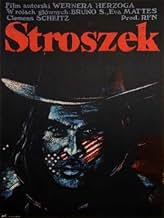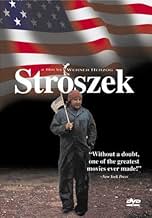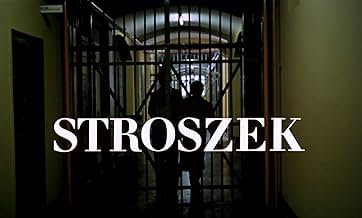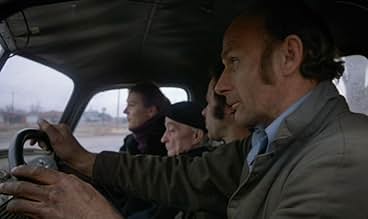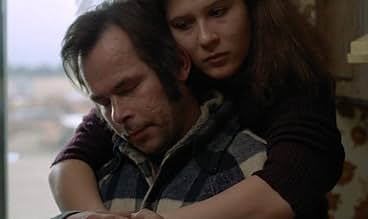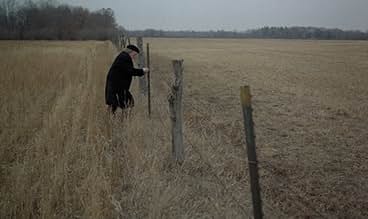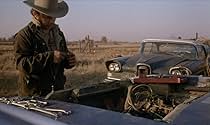A Berlino, un alcoolizzato recentemente uscito di prigione si unisce ad un amico e ad una prostituta per realizzare il suo sogno di lasciare la Germania e cominciare una nuova vita nel Wisco... Leggi tuttoA Berlino, un alcoolizzato recentemente uscito di prigione si unisce ad un amico e ad una prostituta per realizzare il suo sogno di lasciare la Germania e cominciare una nuova vita nel Wisconsin.A Berlino, un alcoolizzato recentemente uscito di prigione si unisce ad un amico e ad una prostituta per realizzare il suo sogno di lasciare la Germania e cominciare una nuova vita nel Wisconsin.
- Regia
- Sceneggiatura
- Star
- Premi
- 2 vittorie e 2 candidature totali
- Scott
- (as Scott Mc Kain)
- Doctor
- (as Dr. Vaclav Vojta)
- Turk prisoner
- (as Yücsel Topcugürler)
- Trucker Pimp
- (non citato nei titoli originali)
Recensioni in evidenza
The running commentary that Herzog has recorded for the recent DVDs of his films are among the most interesting and engaging I've heard, and they're one of the reasons I especially appreciate the DVD medium. That's not to say that he lets the literal-minded viewer off the hook by providing handy explanations for every peculiar image or bit of dialog. When asked what a certain image or phrase signifies, he will sometimes simply say that he cannot explain it. But I find it fascinating to watch a scene, and then scan back and listen to his comments about the location, actors, technical details, and yes, even sometimes the intended effect of a puzzling image. Many of the people seen in his films are non-actors, people he simply ran into, found interesting, and intuitively knew would be effective on film. Some of the players in Herzog's films are the very people that most directors would chase from their set with security guards, but he sees something interesting in them, and finds a way to tap into it. I can't help liking the man for that. Some people have suggested that his use of the unfortunate Bruno S. as a film actor amounted to some sort of exploitation. But it seems to me that his befriending of Bruno, and his artful and patient use of him as a film actor, must have given Bruno some sense of the dignity and worth as a unique human being that was denied him for most of his life. If this means nothing to you, and you don't know anything about Bruno S., the commentary tracks on either "Stroszek" or "The Enigma of Kaspar Hauser" explain his background nicely. It's a remarkable story.
If you're unfamiliar with Herzog's work, he has done some especially exotic films with the volatile actor Klaus Kinski. "Cobra Verde" is a particular favorite of mine. But his films do not have the relentless pace or hyperactive editing typical of mainstream American films. They are unforgiving of those with short attention-spans, so be forewarned.
This intensely moving and satisfying film which begins in Germany and winds up in Wisconsin is solid through and through. There's not a weak moment or weak element to be found. The acting, especially by Bruno S., is completely unaffected and without over-stylization (there is, perhaps, a reason for this - they aren't acting, simply being). The story itself deals with melodramatic elements without steering into soap opera territory and the film's ideology is not black in white. There's subtlety and complexity to the ideas put forth in this film about America, Germany, human beings, life, etc. Moreover, Stroszek avoids beating the audience's brains with its ideas; Herzog presents them in the context of the story, smoothly integrated.
And then there's the beautiful photography, particularly of the American Midwest; Herzog and his cameramen capture perfectly the cold, stark, desolate magnificence of the upper-Plains. To draw a weird comparison, the photography here is the equivalent of Husker Du's New Day Rising - crisp, harsh, and gorgeous simultaneously.
Stroszek also has a justifiably well-known ending, both surreal and completely sensible. Though any other director would be unable to top an ending such as that in Aguirre (the slumped conqueror, floating on a monkey-covered raft), Herzog does just that here.
Truly, if you have not seen any Herzog, this is a great place to start; then go see Aguirre, Fitzcarraldo, Nosferatu, Woyczek, and Invincible. The man is brilliant and I await with bated breath Grizzly Man, his new project.
There are certain messages in this film, and a probably important one is that it's hard to run away from trouble. Moving to a new city, or country in this case, doesn't always do it. When the prostitute leaves Stroszek for Vancouver, leaving him with a mortgage and no income, you know he's screwed. Beyond these elements, Stroszek is a movie with character but is not altogether impressive. Bruno Stroszek is interesting, but not as extraordinary as Kaspar Hauser. Ultimately, it leaves me a little underwhelmed.
Lo sapevi?
- QuizThe entire crew disliked the last sequence so much that director Werner Herzog had to shoot it by himself. Incidentally, he considers this scene the best he has filmed.
- BlooperAfter Bruno, Eva and Scheitz buy a used car, they drive out to Wisconsin. The camera's shadow is visible on the car as Eva drives.
- Citazioni
[last lines]
Deputy Sheriff: We have a 10-80 out here, a truck on fire, we have a man on the lift. We are unable to find the switch to turn the lift off, can't stop the dancing chickens. Send an electrician, we're standing by.
- ConnessioniFeatured in Century of Cinema: Die Nacht der Regisseure (1995)
- Colonne sonoreOn the Way Down to Phoenix
Written and Performed by Chet Atkins
I più visti
- How long is Stroszek?Powered by Alexa
Dettagli
- Data di uscita
- Paese di origine
- Lingue
- Celebre anche come
- Stroszek
- Luoghi delle riprese
- Plainfield, Wisconsin, Stati Uniti(hold up on North Street)
- Aziende produttrici
- Vedi altri crediti dell’azienda su IMDbPro
Botteghino
- Lordo in tutto il mondo
- 3451 USD

